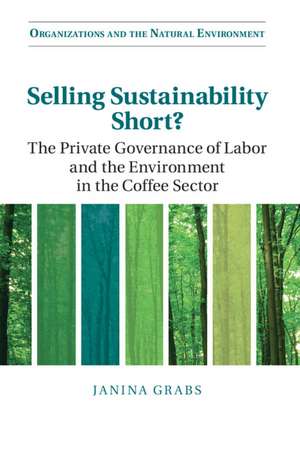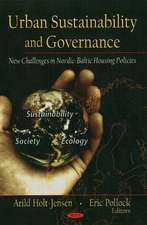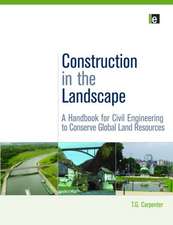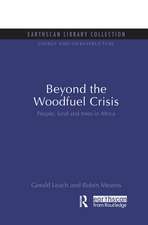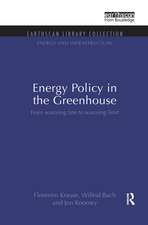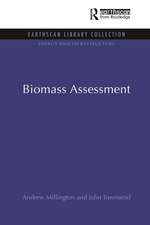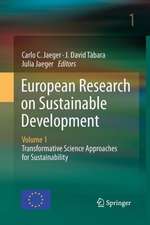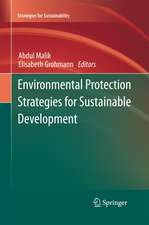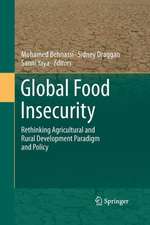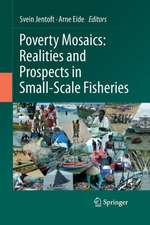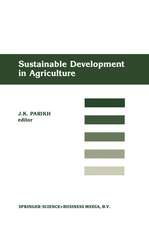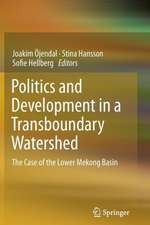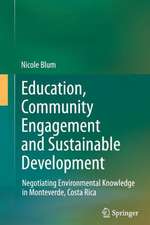Selling Sustainability Short?: The Private Governance of Labor and the Environment in the Coffee Sector: Organizations and the Natural Environment
Autor Janina Grabsen Limba Engleză Paperback – 23 mar 2022
| Toate formatele și edițiile | Preț | Express |
|---|---|---|
| Paperback (1) | 319.99 lei 6-8 săpt. | |
| Cambridge University Press – 23 mar 2022 | 319.99 lei 6-8 săpt. | |
| Hardback (1) | 781.19 lei 3-5 săpt. | |
| Cambridge University Press – 13 mai 2020 | 781.19 lei 3-5 săpt. |
Preț: 319.99 lei
Nou
Puncte Express: 480
Preț estimativ în valută:
61.24€ • 66.49$ • 51.44£
61.24€ • 66.49$ • 51.44£
Carte tipărită la comandă
Livrare economică 23 aprilie-07 mai
Preluare comenzi: 021 569.72.76
Specificații
ISBN-13: 9781108799508
ISBN-10: 1108799507
Pagini: 352
Ilustrații: 16 b/w illus. 22 tables
Dimensiuni: 152 x 228 x 18 mm
Greutate: 0.47 kg
Ediția:Nouă
Editura: Cambridge University Press
Colecția Cambridge University Press
Seria Organizations and the Natural Environment
Locul publicării:Cambridge, United Kingdom
ISBN-10: 1108799507
Pagini: 352
Ilustrații: 16 b/w illus. 22 tables
Dimensiuni: 152 x 228 x 18 mm
Greutate: 0.47 kg
Ediția:Nouă
Editura: Cambridge University Press
Colecția Cambridge University Press
Seria Organizations and the Natural Environment
Locul publicării:Cambridge, United Kingdom
Cuprins
1. Introduction; 2. The dilemma of effective private governance; 3. Defining the goal of a sustainable coffee sector; 4. Changing the market; 5. Changing farming practices; 6. Designing effective private institutions; 7. Interacting with public institutions; 8. Conclusions.
Recenzii
'Is private governance truly improving environmental management and the lives of farmers in developing countries? Every researcher exploring this question will want to read this pathbreaking book, which journeys across coffee farms in Costa Rica, Honduras, and Colombia en route to offering a novel and sophisticated theoretical framework to evaluate the effectiveness of certification, fair-trade labeling, and private sustainability standards.' Peter Dauvergne, Professor of International Relations, University of British Columbia
'Janina Grabs presents in her excellent study Selling Sustainability Short? a detailed, comprehensive, and nuanced analysis of the often-lacking effectiveness of coffee certification on the ground, pushing the state of the debate to a new level.' Frank Biermann, Professor of Global Sustainability Governance, Utrecht University
'This remarkable and beautifully written book applies novel and highly sophisticated theoretical and methodological approaches to study the effectiveness of voluntary private sustainability standards. Bringing together analysis of standards design, standards interactions, and on-the-ground practices and impacts among coffee growers in Central America, it finds that sustainability standards have often lost their way, failing to create viable alternatives to conventional market systems.' Kenneth W. Abbott, Jack E. Brown Chair in Law Emeritus and Professor of Global Studies, Arizona State University
'With its careful examination of coffee farms in three countries and sharp theoretical insights, Selling Sustainability Short significantly raises the bar for research on private regulation. It is brimming with fresh concepts and findings, which show how the mainstreaming of sustainability standards has gone wrong.' Tim Bartley, Professor of Sociology, Washington University in St. Louis, author of Rules without Rights: Land, Labor, and Private Authority in the Global Economy
'Janina Grabs provides an excellent practical and theoretical guide for how to effectively manage sustainability certification programs. She offers a rare and illuminating in-depth analysis of the creation and long-term implementation of green certification programs. You will treasure this book if you want to know how green certification can not only help large multinational corporations but also provide economic and environmental benefits to local producers around the world.' Jorge E. Rivera, Professor and Ave Tucker Fellow, Department of Strategic Management & Public Policy, The George Washington University
'This book by Janina Grabs on the private governance of coffee production is a path-breaking work that makes numerous contributions to scholarly understanding of regulatory governance. Prior research on private sustainability standards has often struggled to capture either the day-to-day life of farmers and producers at the start of the supply chain, the relationship between market dynamics and certification schemes, or the broader effectiveness of these certification schemes. Grabs's vast data collection and fieldwork efforts across three coffee-producing nations enable her to make important inferences about each of these elements of the private, sustainability standards of coffee production, thereby providing a comprehensive and detailed picture of the coffee industry and its relationship with the physical environment. This book will be of significant interest to scholars across a wide range of disciplines, including those who study environmental policy and regulation, private governance standards or regulation and governance, broadly speaking.' Colin Provost, Associate Professor of Public Policy, University College London
'The contested meaning of 'sustainability' is at the center of debates about how to address a growing number of environmental and social crises. In Selling Sustainability Short, Janina Grabs convincingly explains why the proliferation of sustainability standards has watered down the term to a point where it means very little indeed. Provocative, insightful, meticulously researched and deeply critical - this book is required reading for anyone interested in whether market-based approaches to sustainability can work.' Hamish van der Ven, Assistant Professor, Department of Political Science and School of Environment, McGill University
'Selling Sustainability Short is one of the most important books on sustainability governance of the past decade, and the best book on coffee I have read in a very long time. Janina Grabs meticulously chronicles how market-driven governance instruments suffer from serious institutional design dilemmas as they seek to mainstream sustainability. She shows that the success of sustainability governance in coffee value chains and beyond derives from the ability of coupling relatively strict standards with support for suppliers to comply with them. Theoretically informed and empirically rich, Selling Sustainability Short is a pearl of a book.' Stefano Ponte, Professor, Department of Management, Society and Communication, Copenhagen Business School, and co-author (with Benoit Daviron) of The Coffee Paradox: Global Markets, Commodity Trade and the Elusive Promise of Development
'Once in a generation a book appears that is so impressive in its theoretical rigour, empirical research, and practical importance for the world, that it grabs you and doesn't let go. Grabs has produced just such a tome. She is clearly deeply motivated by a curiosity about whether private governance and corporate social responsibility initiatives might indeed be more 'effective and efficient' than traditional governmental processes in addressing enduring environmental challenges. To answer this question, she spent years in the field generating her own primary quantitative data of decades of 'on the ground' impacts, which she reinforced this research through careful and systematic interviews with officials working at multiple governance levels, to carefully and systematically assesses ecolabeling in the coffee sector. A must read not only for students of the politics and policies of commodities and environment, but for anyone interested in understanding whether, and how, innovative policies might be developed, and championed, to meaningfully promote environmental stewardship in the global era.' Benjamin Cashore, Li Ka Shing Professor in Public Management, Lee Kuan Yew School of Public Policy, National University of Singapore
'… I recommend this great book without any reservation to anyone interested in voluntary business practices toward sustainable goals - in coffee and beyond. It is theoretically sophisticated and empirically rich and is likely to inspire new ideas and conversations about the path toward more labor and environmentally friendly production.' Luc Fransen, Perspectives on Politics
'Janina Grabs presents in her excellent study Selling Sustainability Short? a detailed, comprehensive, and nuanced analysis of the often-lacking effectiveness of coffee certification on the ground, pushing the state of the debate to a new level.' Frank Biermann, Professor of Global Sustainability Governance, Utrecht University
'This remarkable and beautifully written book applies novel and highly sophisticated theoretical and methodological approaches to study the effectiveness of voluntary private sustainability standards. Bringing together analysis of standards design, standards interactions, and on-the-ground practices and impacts among coffee growers in Central America, it finds that sustainability standards have often lost their way, failing to create viable alternatives to conventional market systems.' Kenneth W. Abbott, Jack E. Brown Chair in Law Emeritus and Professor of Global Studies, Arizona State University
'With its careful examination of coffee farms in three countries and sharp theoretical insights, Selling Sustainability Short significantly raises the bar for research on private regulation. It is brimming with fresh concepts and findings, which show how the mainstreaming of sustainability standards has gone wrong.' Tim Bartley, Professor of Sociology, Washington University in St. Louis, author of Rules without Rights: Land, Labor, and Private Authority in the Global Economy
'Janina Grabs provides an excellent practical and theoretical guide for how to effectively manage sustainability certification programs. She offers a rare and illuminating in-depth analysis of the creation and long-term implementation of green certification programs. You will treasure this book if you want to know how green certification can not only help large multinational corporations but also provide economic and environmental benefits to local producers around the world.' Jorge E. Rivera, Professor and Ave Tucker Fellow, Department of Strategic Management & Public Policy, The George Washington University
'This book by Janina Grabs on the private governance of coffee production is a path-breaking work that makes numerous contributions to scholarly understanding of regulatory governance. Prior research on private sustainability standards has often struggled to capture either the day-to-day life of farmers and producers at the start of the supply chain, the relationship between market dynamics and certification schemes, or the broader effectiveness of these certification schemes. Grabs's vast data collection and fieldwork efforts across three coffee-producing nations enable her to make important inferences about each of these elements of the private, sustainability standards of coffee production, thereby providing a comprehensive and detailed picture of the coffee industry and its relationship with the physical environment. This book will be of significant interest to scholars across a wide range of disciplines, including those who study environmental policy and regulation, private governance standards or regulation and governance, broadly speaking.' Colin Provost, Associate Professor of Public Policy, University College London
'The contested meaning of 'sustainability' is at the center of debates about how to address a growing number of environmental and social crises. In Selling Sustainability Short, Janina Grabs convincingly explains why the proliferation of sustainability standards has watered down the term to a point where it means very little indeed. Provocative, insightful, meticulously researched and deeply critical - this book is required reading for anyone interested in whether market-based approaches to sustainability can work.' Hamish van der Ven, Assistant Professor, Department of Political Science and School of Environment, McGill University
'Selling Sustainability Short is one of the most important books on sustainability governance of the past decade, and the best book on coffee I have read in a very long time. Janina Grabs meticulously chronicles how market-driven governance instruments suffer from serious institutional design dilemmas as they seek to mainstream sustainability. She shows that the success of sustainability governance in coffee value chains and beyond derives from the ability of coupling relatively strict standards with support for suppliers to comply with them. Theoretically informed and empirically rich, Selling Sustainability Short is a pearl of a book.' Stefano Ponte, Professor, Department of Management, Society and Communication, Copenhagen Business School, and co-author (with Benoit Daviron) of The Coffee Paradox: Global Markets, Commodity Trade and the Elusive Promise of Development
'Once in a generation a book appears that is so impressive in its theoretical rigour, empirical research, and practical importance for the world, that it grabs you and doesn't let go. Grabs has produced just such a tome. She is clearly deeply motivated by a curiosity about whether private governance and corporate social responsibility initiatives might indeed be more 'effective and efficient' than traditional governmental processes in addressing enduring environmental challenges. To answer this question, she spent years in the field generating her own primary quantitative data of decades of 'on the ground' impacts, which she reinforced this research through careful and systematic interviews with officials working at multiple governance levels, to carefully and systematically assesses ecolabeling in the coffee sector. A must read not only for students of the politics and policies of commodities and environment, but for anyone interested in understanding whether, and how, innovative policies might be developed, and championed, to meaningfully promote environmental stewardship in the global era.' Benjamin Cashore, Li Ka Shing Professor in Public Management, Lee Kuan Yew School of Public Policy, National University of Singapore
'… I recommend this great book without any reservation to anyone interested in voluntary business practices toward sustainable goals - in coffee and beyond. It is theoretically sophisticated and empirically rich and is likely to inspire new ideas and conversations about the path toward more labor and environmentally friendly production.' Luc Fransen, Perspectives on Politics
Notă biografică
Descriere
This large-N, three-country study of the coffee sector assesses the effectiveness of private governance by standards in promoting sustainable production.
